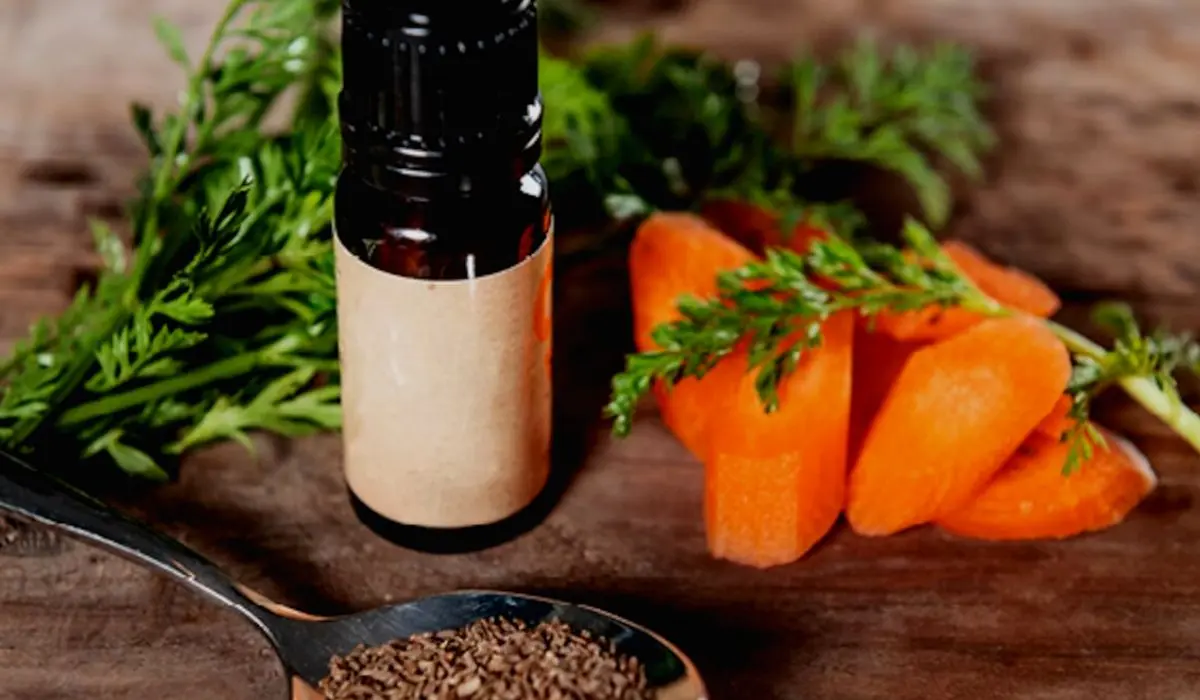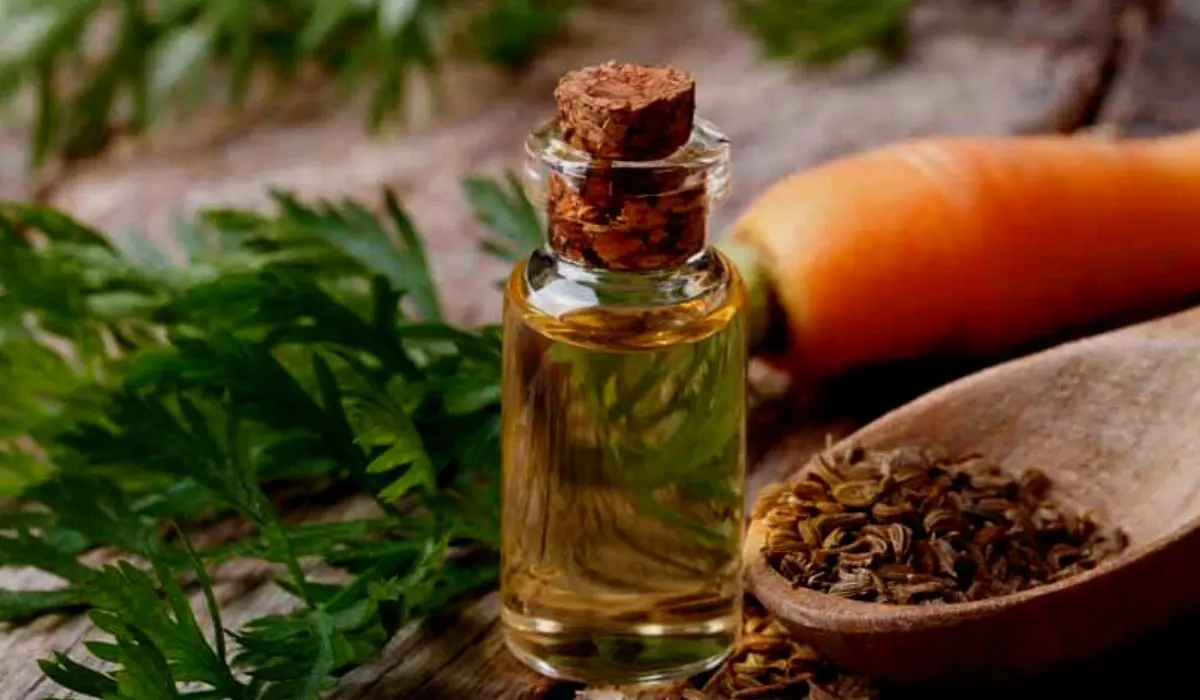Carrot seed oil is an essential oil extracted from the dried seeds of the Daucus carota plant. It has gained popularity in recent years as a natural ingredient used topically for skin and hair care.
Carrot seed oil is known to have antibacterial, antifungal, and antioxidant properties that can benefit the skin. However, despite being natural, it may cause side effects in some individuals. It is important to learn how to use carrot seed oil safely.
What Is Carrot Seed Oil? How Is It Used On The Skin?
Carrot seed oil is steam distilled from the dried seeds of the wild carrot plant. It has a woody, earthy aroma.
The oil contains carotol, carotene, and vitamin C which give it antioxidant and mild exfoliant properties. The main chemical compounds are carotol, daucol, and daucene which make it antimicrobial.

When applied topically, carrot seed oil can help achieve the following skin benefits:
- Moisturizes dry skin and repairs epidermal damage
- Fades scars, and marks, and evens out skin tone
- Reduces wrinkles and signs of aging
- Treats acne and pimples due to its antibacterial effects
- Serves as a mild natural exfoliant by encouraging cell turnover
- Improves elasticity and boosts collagen production
- Soothes rashes, itching, and inflammation
- Helps detoxify skin and shrink enlarged pores
Carrot seed oil is commonly used in face oils, creams, soaps, masks, and exfoliants meant for regular skin care. It is also added to carrier oils for massage. Despite its benefits, carrot seed oil does come with precautions.
Steps To Prepare Carrot Seed Oil For Skin
- Always dilute carrot seed oil before application as it is very potent. Mix 2-3 drops with a teaspoon of carrier oil like coconut, almond, or jojoba oil.
- Do a patch test before the first use. Apply diluted oil on the inner arm and check for reaction overnight.
- Wash face with a gentle cleanser and pat dry before applying carrot seed oil.
- For the face, mix 2-3 drops into moisturizer and apply once daily at night.
- As a body oil, add 4-5 drops per ounce of carrier and massage onto the skin.
- For hair, combine 2 drops each of carrot seed oil and lime essential oil with 2 tbsp coconut oil.
- Use carrot seed oil scrub 2-3 times a week by combining 2 tsp powdered oats with 1 tsp almond oil and 2 drops of carrot seed oil.
- Store in a dark glass bottle away from sunlight and heat to preserve efficacy. Shelf life is around 1 year.
What Are The Side Effects Of Carrot Seed Oil on Skin?
Despite being natural, some people may experience undesirable side effects when applying carrot seed oil to the skin:
- Skin irritation – Redness, itching, burning, rashes, and dermatitis may occur in those with sensitive skin who are allergic to carrot seed compounds.
- Photosensitivity – Carotol makes skin sensitive to UV rays, increasing vulnerability to sun damage and burns.
- Phytophotodermatitis – Carrot seed oil can cause phototoxic reactions when exposed to sunlight, marked by blisters and pigmentation.
- Skin discoloration – The orange/reddish pigments may stain light skin with prolonged use.
- Premature aging – Exposure to sunlight while using carrot seed oil can degrade collagen and cause early wrinkles.
- Allergic reactions – Some individuals may experience hives, swelling, and anaphylaxis when applying carrot seed oil, especially undiluted.
- Headaches – The carrot seed oil aroma is very strong and can trigger headaches or nausea when inhaled in excess.
While these side effects are not very common, they indicate the need for cautious use based on your skin type and circumstances.
Related:- Is Talcum Powder Good For Skin Rash? Benefits Of Talcum Powder
Tips And Precautions When Applying Carrot Seed Oil On Skin
- Always dilute carrot seed oil first in carrier oils before applying it directly on the face or body skin.
- Perform a patch test before use and discontinue if any irritation occurs.
- Avoid going out in direct sunlight for a few hours after applying carrot seed oil.
- Do not use it if you have very sensitive skin prone to allergies or dermatitis.
- Pregnant and breastfeeding women should consult their doctor before using.
- Use only mild, natural cleansers after applying carrot seed oil.
- Do not apply carrot seed oil on broken, damaged, or inflamed skin.
- Mix with healing oils like lavender or chamomile oil if you have eczema, psoriasis, or dermatitis.
- Store the oil properly in an opaque, airtight bottle and discard if it smells rancid or changes color.
- Use only good quality, organic, cold-pressed carrot seed oil and not fragrance-based perfume oils.
With careful use, carrot seed oil can be beneficial for the skin. But know your skin type, assess risks, and take precautions to avoid adverse effects.
Conclusion
When used topically on the skin at proper dilution, carrot seed essential oil can have antioxidant, antimicrobial, exfoliating, and collagen-boosting effects. However, some people may experience side effects like irritation, rashes, photosensitivity, or discoloration.
Doing a patch test before use, avoiding sunlight exposure after application, diluting it in carrier oils, and checking if you have specific allergies can prevent undesirable reactions. Carrot seed oil offers many benefits for skin health, but knowing how to use it safely is key.
Read More:- What Are Razor Bumps? How Can You Prevent Them?
FAQs
1. Is carrot seed oil comedogenic?
No, carrot seed oil is considered non-comedogenic so it does not clog pores or cause acne breakouts in most people. In fact, its antimicrobial properties can help fight acne.
2. Can you use carrot seed oil undiluted?
It is not recommended to apply undiluted carrot seed oil directly as it can irritate and cause sensitization. Always mix it first with carrier oils like coconut or jojoba oil.
3. What is the recommended ratio for diluting carrot seed oil?
Most experts suggest diluting carrot seed oil in a 1% ratio initially. This equals 1 drop of carrot seed oil per teaspoon of carrier oil. Gradually build up concentration based on skin tolerance.
4. Should you wash off carrot seed oil after applying it?
You can allow diluted carrot seed oil to absorb into your skin. There is no need to wash it off unless you experience irritation, stinging, or redness after application.
5. Is carrot seed oil safe for sensitive skin?
Carrot seed oil should be used with caution on sensitive or allergy-prone skin. Always do a patch test first. Avoid if any redness, itching, or irritation occurs, and dilute very well before use.

